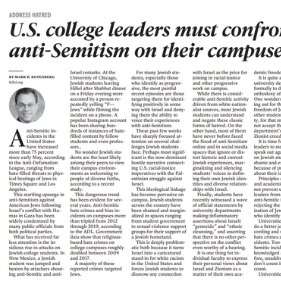U.S. college leaders must confront anti-Semitism on their campuses

Anti-Semitic incidents in the United States have increased more than 75 percent since early May, according to the Anti-Defamation League, ranging from hate-filled threats to physical beatings of Jews in Times Square and Los Angeles.
This startling upsurge in anti-Semitism against American Jews following Israel’s conflict with Hamas in Gaza has been widely condemned by many public officials from both political parties.
What has received far less attention is the insidious rise in attacks on Jewish college students. In New Mexico, a Jewish student was jumped and beaten by attackers shouting anti-Semitic and anti-Israel remarks. At the University of Chicago, Jewish students leaving Hillel after Shabbat dinner on a Friday evening were accosted by a person repeatedly yelling “F— Jews” while filming the incident on a phone. A popular Instagram account has been sharing hundreds of instances of hate-filled content by fellow students and even professors.
No wonder Jewish students are the least likely among their peers to view their campus environments as welcoming to people of diverse faiths, according to a recent study.
This dangerous trend has been evident for several years. Anti-Semitic hate crimes and bias incidents on campuses more than tripled from 2012 through 2019, according to the ADL. Government data show that religious based hate crimes on college campuses roughly doubled between 2009 and 2017.
A majority of these reported crimes targeted Jews.
For many Jewish students, especially those who identify as progressive, the most painful recent episodes are those targeting them for identifying positively in some way with Israel and denying them the ability to voice their experiences with anti-Semitism.
These past few weeks have sharply focused attention on several challenges Jewish students face. Perhaps most significant is the now-dominant hostile narrative connecting U.S. racial-justice imperatives with the Palestinian struggle against Israel.
This ideological linkage has become pervasive on campus. Jewish students across the country have been shamed and marginalized in spaces ranging from student government to sexual-violence support groups for their support of a Jewish homeland.
This is deeply problematic both because it turns Israel into a caricatured stand-in for white racism in the United States and forces Jewish students to disavow any connection with Israel as the price for joining in racial-justice and other progressive work on campus.
While there is considerable anti-Semitic activity driven from white-nationalist sources, most Jewish students can understand and negate these classic forms of hatred. On the other hand, most of them have never before faced the flood of anti-Semitism online and in social media spaces that ignore or distort historic and current Jewish experiences, marginalizing and silencing students’ voices in defining their own Jewish identities and diverse relationships with Israel.
Finally, students have recently witnessed a wave of official statements by university departments making inflammatory assertions about Israeli “genocide” and “ethnic cleansing,” and asserting that there is no other perspective on the conflict even worthy of a hearing.
It is one thing for individual faculty to express their personal views about Israel and Zionism as a matter of their own academic freedom.
It is quite another for university departments formally to declare an orthodoxy of viewpoint. One wonders who is looking out for the academic freedom of Jewish and other students (and faculty, for that matter) who do not accept their academic department’s official anti-Zionist creed.
It is time for college leaders to step up and speak out against attacks on Jewish students that shame and exclude them because of presumptions about their identity.
Principles of free speech and academic freedom do not prevent university leaders from condemning anti-Semitic incidents and rejecting the marginalization of Jewish students who identify with Israel.
Universities also must do a better job of recording and reporting all hate crimes and bias incidents. Too often, anti-Semitic incidents go unacknowledged and, therefore, unaddressed. If you don’t count it, it doesn’t count.
Universities must offer enhanced educational programming on anti-Semitism for students and administrators to help them understand anti-Semitism and anti-Semitic forms of anti-Zionism and take affirmative steps to address them.
Such steps must be understood as part of a commitment already shared by universities to eliminate all forms of racism, discrimination and harassment.
Finally, schools should create robust opportunities for all students to engage in serious dialogue across differences.
Only through genuine relationship building and inclusive learning can students begin to break down destructive stereotypes and appreciate one another’s personal, unique stories.
At this fraught moment on campuses across America, university leaders have the opportunity — and responsibility — to foster understanding between communities and ensure a campus culture that is truly inclusive of diverse backgrounds and beliefs.
#
Mark B. Rotenberg is Hillel International’s Vice President of University Initiatives and Legal Affairs, and an adjunct professor of law at American University.